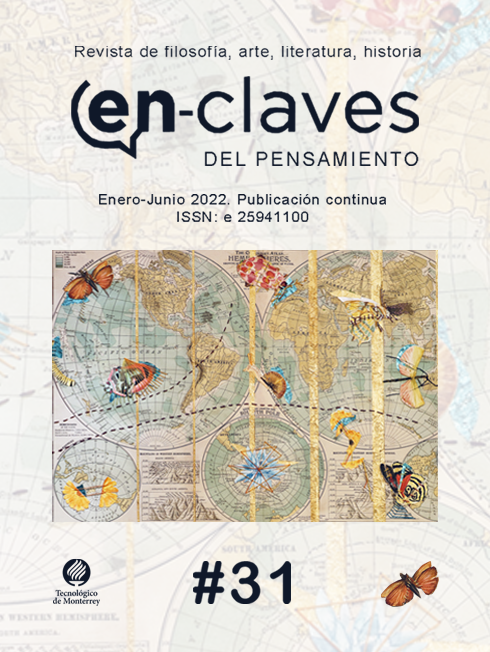The Vulnerability of Phýsis according to Hans-Georg Gadamer
Main Article Content
Beuchot, Mauricio. “La hermenéutica analógica en la interdisciplinariedad de las ciencias humanas”. En Franciscanum. Revista de las Ciencias del Espíritu, LIII, núm. 155 (enero-junio, 2011): 127-144.
Böhme, G. “Atmosphäre als Grundbegriffeiner neuen Ästhetik”. En Atmosphäre. Essays zur neuen Ästhetik, 21-48. Frankfurt a. M.: Suhrkamp, 1995.
Boula, Jean-Gilles. “De la douleur et de la souffrance à la qualité de vie du patient”. Fondation Genevoise pour la Formation et la Recherche Médicales, 2017.
Calvo Martínez, Tomás. “La noción de Phýsis en los orígenes de la filosofía griega”. En Daimon, Revista Internacional de Filosofía, núm. 21 (2000): 21-38.
Csikszentmihalyi, Mihali. Finding Flow: The Psychology of Engagement with Everyday Life. New York: Basic Books, 1977.
Foucault, Michel. Las palabras y las cosas. México: Siglo XXI, 1968.
Foucault, Michel. La Hermenéutica del Sujeto. México: FCE, 2006.
Gadamer, Hans-Georg. Verdad y Método. Fundamentos de una hermenéutica filosófica. Trad. de Ana Agud Aparicio y Rafael de Agapito. Salamanca: Ediciones Sígueme, 1977.
Gadamer, Hans-Georg. “Una Apología del Arte de Curar”. En El Estado Oculto de la Salud. Barcelona: Gedisa, 2001. [ Se consultó también la versión alemana: Festschrift ful Paul Vögler. En Über die Verborgenheit der Gesundheit Leipzig, 1965. Jaeger W. Paideia: los ideales de la cultura griega].
Gadamer, Hans-Georg. Educar es educarse. Barcelona: Paidós, 2000.
Geertz, Clifford. “Distinguished Lecture: Anti Anti-Relativism”, American Anthropologist, New Series 86, núm. 2. (junio, 1984): 263-278.
Harvey, David. The Condition of Postmodernity. An Enquiry into the Origins of Cultural Change. Oxford: Blackwell, 1990.
Heidegger, Martin. “Art and Space”. En Rethinking Architecture: A Reader in Cultural Theory, 121-124. Edición de Neil Leach. New York: Routledge, 1997.
Jaeger, Werner. Paideia: los ideales de la cultura griega. Buenos Aires: Fondo de Cultura Económica, 2001.
Lacan, Jacques. “Kant avec Sade”. En Écrits, 765-790. París: Seuil, 2006.
Lorentzen, Jakob Due. Sculpture and the Sense of Place. Aarhus, Dinamarca: Aarhus University.
Lyotard, Jean-François. “Aviso de Diluvio”. Quinta cátedra internacional de arte, Luis Ángel Arango, Biblioteca Luis Ángel Arango, Banco de la República, Bogotá, 1995.
Mascaro, Alysson. “Gadamer: hermenêutica existencial e saúde”. Revista de Direito, 11, núm. 2 (2019): 68-78.
McWhorter, Mathew. “Gadamer’s philosophical hermeneutics and the formation of mental health professionals”. Journal of Theoretical and Philosophical Psychology. Advance online publication, 2020. https://doi.org/10.1037/teo0000169.
Pohlenz, M. “Nómos und Phýsis”. Hermes, 81, núm. 4 (1953): 418-438.
Platón. Fedro. En Diálogos III. Madrid: Gredos, 2003.
Platón. Protágoras, Gorgias, Menón. Barcelona: Edaf, 2007.
Ricœur, Paul. “La souffrance n’est pas la douleur”. En Souffrance et douleur, 13-33. Compilación de Claire Marin, Nathalie Zaccaï-Reyners. Paris: PUF, 2013.
Rodríguez, E. J. “En la zona: cuando todo te sale bien”. Jot-Down Contemporary Culture Magazine. https://www.jotdown.es/2016/01/la-zona-cuando-te-sale-bien/.
Rousseau, Juan Jacobo. Discurso sobre el origen de la desigualdad entre los hombres. Buenos Aires: Aguilar, 1960.
Papa Francisco (2015) Laudato Si’: Enciclica sulla cura della casa comune.
Rorty, Richard. Contingence, Irony and Solidarity. New York: Cambridge University Press, 1989.
Rorty Richard. Objetivity Relativism and Truth. Philosophical papers. Vol 1. New York: Cambridge University Press, 1990
Zeiger, Mimi. “From Nets to Networks. The Aerial Artwork of Janet Echelman”. Architect Magazine, 15 de junio 2016 [consultado el 27 de enero de 2021].













